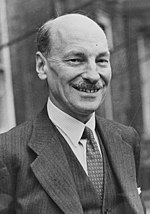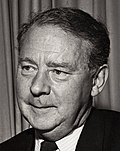The post-war consensus, sometimes called the post-war compromise, was the economic order and social model of which the major political parties in post-war...
31 KB (4,136 words) - 02:35, 27 September 2024
election, the so-called post-war consensus. at its narrowest, usually with precise or contextual qualifiers, it is the war's direct aftermath; this prompted...
9 KB (1,084 words) - 08:13, 29 August 2024
The post–World War II economic expansion, also known as the postwar economic boom or the Golden Age of Capitalism, was a broad period of worldwide economic...
39 KB (4,577 words) - 20:49, 16 November 2024
promised a much better post-war Britain and saw the need to engage every sector of society. The foundations of the post-war consensus was the Beveridge Report...
41 KB (4,835 words) - 12:32, 28 September 2024
published its Industrial Charter which marked its acceptance of the "post-war consensus" on the mixed economy and labour rights. David Maxwell Fyfe chaired...
252 KB (21,334 words) - 08:56, 21 November 2024
between 1945 and 1970 (the years of the consensus), unemployment averaged less than 3%. The post-war consensus included a belief in Keynesian economics...
31 KB (3,679 words) - 08:31, 15 October 2024
Attlee ministry (redirect from Post-war Labour government)
election, and went on to enact policies of what became known as the post-war consensus, including the establishment of the welfare state and the nationalisation...
93 KB (8,267 words) - 14:03, 20 November 2024
post World War II consensus in American politics Post-war consensus – the post World War II consensus in United Kingdom politics Washington Consensus...
462 bytes (85 words) - 17:56, 28 January 2021
accepted by the Conservatives and Liberals and became part of the "post-war consensus" that lasted until the Thatcher era of the 1980s. Labour spent 13...
184 KB (15,452 words) - 08:39, 21 November 2024
Mixed economy (redirect from Post-war social democracy)
a combination of socialism and liberal democracy) as part of the post-war consensus, a mixed economy is in practice a form of capitalism where most industries...
60 KB (7,438 words) - 02:53, 17 October 2024
anti-Soviet factor in the Cold War and helped found NATO in 1949. Many historians describe this era as the "post-war consensus", emphasising how both the...
61 KB (7,538 words) - 05:22, 6 November 2024
Conservative Party continued to espouse the philosophy throughout the post-war consensus from 1945. One-nation thinking influenced their tolerance of the Labour...
21 KB (2,308 words) - 23:36, 14 September 2024
the post-war consensus and neo-Keynesian economics to address the stagflation of the 1970s. The collapse of the USSR and the end of the Cold War also...
282 KB (29,462 words) - 09:00, 17 November 2024
1980s. Although the post-war consensus represented a period where social democracy was "most buoyant", it has been argued that "post-war social democracy...
151 KB (16,292 words) - 13:30, 21 November 2024
"triumph for progressive reform," and it became a core element of the post-war consensus supported by all major parties. The Act was repealed in steps with...
18 KB (1,948 words) - 19:21, 25 September 2024
contributed to the rise of politicians that represent a return to the post-war consensus social democracy, such as Jeremy Corbyn in the United Kingdom and...
145 KB (14,572 words) - 00:59, 21 November 2024
Atlantic Alliance (in the military sphere). In domestic policy, a post-war consensus saw the leadership of the Labour and Conservative parties largely...
109 KB (13,155 words) - 15:29, 24 July 2024
became prime minister and brought about the end to some aspects of the Post-war consensus on economic policy. For instance, her government created the right-to-buy...
59 KB (5,569 words) - 16:34, 21 November 2024
Thatcherism represents a systematic, decisive rejection and reversal of the post-war consensus inside Great Britain in terms of governance, whereby the major political...
66 KB (7,186 words) - 20:32, 10 November 2024
Paul Addison (category British historians of World War II)
notable for The Road to 1945 (1975) which traced the origins of the post-war consensus into the wartime period. Paul Addison was born in Whittington, near...
9 KB (937 words) - 12:29, 14 November 2024
Generation X (section The post–civil rights generation)
conservative governments from 1979 to 1997 marked the end of the post-war consensus. The almost universal dismantling of the grammar school system in...
171 KB (16,757 words) - 23:51, 21 November 2024
policies. This was termed Butskellism and laid the foundation for the post-war consensus. During the period of opposition, the feud between the Gaitskellites...
12 KB (1,530 words) - 18:28, 5 September 2024
Joseph, Alfred Sherman and Margaret Thatcher in 1974 to challenge the post war consensus of Keynesianism, and to champion economic liberalism in Britain. With...
18 KB (1,896 words) - 09:26, 4 September 2024
exists in the world". The post-war Communist Party Historians Group was critical of the Fabians, and indeed the post-war consensus, with its strong social-democratic...
50 KB (5,700 words) - 20:24, 15 November 2024
Italian Socialist Party (section Post-World War II)
its public debt. While associated with neoliberal policies, as the post-war consensus around social democracy was on the defensive amid the crisis of the...
62 KB (6,000 words) - 08:42, 12 November 2024
state. By 1945, the Post-war consensus emerged, delivering a welfare state. The Royal family played major symbolic roles during the war. They refused to...
62 KB (8,106 words) - 00:41, 4 October 2024
Centre-left politics (section Post-war politics)
ideas proliferated rapidly after the Great Depression and World War II. A post-war consensus formed among policymakers in Western Europe that rejected both...
47 KB (5,431 words) - 16:25, 8 November 2024
of Labour politics. The book defined Labour's perspective on the post-war consensus, by which the major parties largely agreed on issues of the welfare...
14 KB (1,818 words) - 04:01, 27 September 2024
a satirical term blending their names, and was one aspect of the post-war consensus through which the major parties largely agreed on the main points...
102 KB (13,379 words) - 15:38, 3 November 2024
The post–Cold War era is a period of history that follows the end of the Cold War, which represents history after the dissolution of the Soviet Union...
23 KB (2,731 words) - 09:02, 20 October 2024













